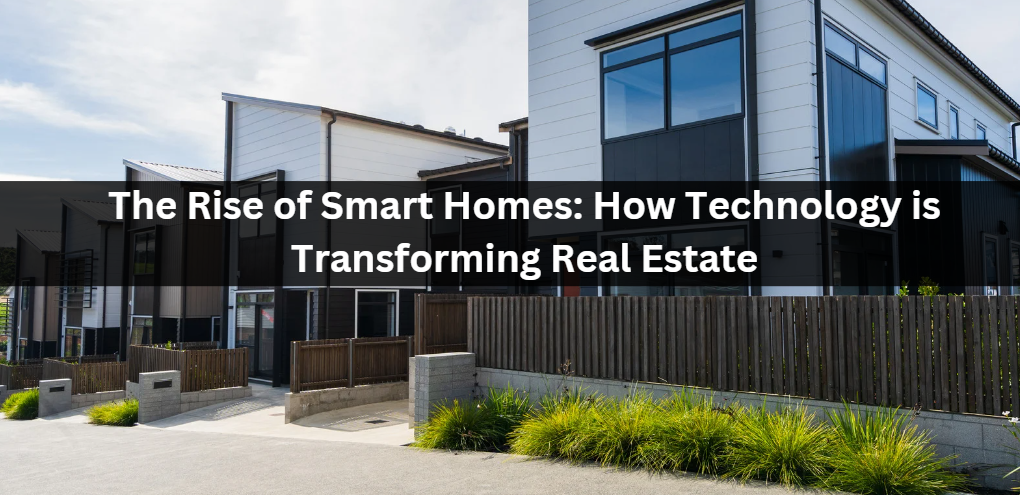Smart homes are rapidly reshaping the real estate landscape, offering innovative solutions that enhance convenience, efficiency, and security. As technology continues to advance, the integration of smart home features is becoming a key consideration for both buyers and sellers. This article explores how smart home technology is transforming the real estate market, the benefits of smart homes, and the future trends that are likely to influence the industry.
Contents
1. Understanding Smart Home Technology
1.1. What is a Smart Home?
A smart home is a residence equipped with interconnected devices that can be controlled remotely through a smartphone, tablet, or voice commands. These devices communicate via a central hub or network, allowing homeowners to manage various aspects of their home environment from virtually anywhere.
1.2. Key Components of Smart Homes
- Smart Lighting: Adjustable lighting systems that can be controlled remotely or programmed for specific schedules.
- Smart Thermostats: Devices that learn user preferences and adjust heating and cooling automatically for optimal comfort and energy savings.
- Smart Security Systems: Integrated cameras, motion detectors, and smart locks that enhance home security and provide real-time alerts.
- Smart Appliances: Kitchen and household appliances that can be controlled remotely and provide notifications on usage and maintenance needs.
- Voice Assistants: AI-powered devices like Amazon Alexa or Google Assistant that can manage various smart home functions through voice commands.
2. Impact on the Real Estate Market
2.1. Increased Property Value
Enhanced Appeal
- Attractiveness to Buyers: Homes with smart technology are increasingly appealing to tech-savvy buyers who value convenience and modern features.
- Higher Resale Value: Properties equipped with smart home features often command higher resale values due to their advanced technology and added benefits.
Competitive Edge
- Market Differentiation: Smart homes stand out in a crowded market, offering a unique selling point that can attract more interest and potentially lead to quicker sales.
2.2. Energy Efficiency and Cost Savings
Reduced Utility Costs
- Optimized Energy Use: Smart thermostats and lighting systems can significantly reduce energy consumption by adjusting settings based on usage patterns and occupancy.
- Cost Benefits: Lower utility bills can be a major selling point for buyers looking to save on long-term expenses.
Sustainability
- Eco-Friendly Features: Smart homes often include energy-efficient appliances and systems, contributing to a more sustainable lifestyle and appealing to environmentally conscious buyers.
2.3. Enhanced Security
Improved Safety
- Real-Time Monitoring: Smart security systems provide homeowners with real-time alerts and remote access to security cameras, enhancing overall safety and peace of mind.
- Advanced Features: Features such as smart locks and video doorbells offer additional layers of security and convenience.
Insurance Benefits
- Potential Discounts: Some insurance companies offer discounts for homes equipped with smart security systems, recognizing the reduced risk of theft and damage.
3. Benefits for Homebuyers and Sellers
3.1. For Homebuyers
Convenience and Control
- Remote Management: The ability to control home systems remotely adds a layer of convenience, allowing homeowners to manage their environment from anywhere.
- Customization: Smart home technology enables personalized settings, from adjusting the thermostat to controlling lighting and appliances.
Future-Proofing
- Technological Integration: Purchasing a home with smart features ensures that the property is equipped with the latest technology, reducing the need for future upgrades.
3.2. For Home Sellers
Increased Marketability
- Attracting Buyers: Homes with smart features are often more attractive to buyers, helping to differentiate properties in a competitive market.
- Faster Sales: Properties with modern technology may sell faster due to their appeal and added value.
Higher Return on Investment
- Upgraded Features: Investing in smart home upgrades can provide a higher return on investment by increasing the property’s market value and appeal.
4. Challenges and Considerations
4.1. Privacy and Security Concerns
Data Protection
- Security Risks: Smart home devices can be vulnerable to cyberattacks, making it essential to implement robust security measures and regularly update device software.
- Privacy Issues: The collection of data by smart devices raises privacy concerns. Buyers should be aware of how their data is used and protected.
Integration Challenges
- Compatibility: Ensuring that various smart devices work seamlessly together can be a challenge. Buyers should consider compatibility when evaluating smart home options.
4.2. Cost of Implementation
Initial Investment
- Upfront Costs: The initial cost of installing smart home technology can be significant. Buyers and sellers should weigh these costs against the long-term benefits and potential return on investment.
Maintenance
- Ongoing Maintenance: Smart home systems may require regular maintenance and updates to function optimally. Buyers should be prepared for potential ongoing costs and technical support.
5. Future Trends in Smart Home Technology
5.1. Integration with Artificial Intelligence (AI)
Enhanced Automation
- AI Capabilities: AI is expected to play a larger role in smart homes, providing even more advanced automation and predictive capabilities.
- Personalization: AI-driven systems will offer more personalized experiences by learning and adapting to individual preferences and behaviors.
5.2. Interoperability and Standards
Unified Platforms
- Improved Compatibility: Efforts are underway to create universal standards and platforms that ensure compatibility among different smart home devices and systems.
- Seamless Integration: Enhanced interoperability will make it easier for homeowners to manage and integrate various smart devices.
5.3. Increased Focus on Sustainability
Green Technology
- Eco-Friendly Innovations: Future smart home developments will likely focus on sustainability, with advancements in energy-efficient and eco-friendly technologies.
- Smart Grid Integration: Integration with smart grids and renewable energy sources will further enhance the environmental benefits of smart homes.
Conclusion
The rise of smart homes is transforming the real estate market by introducing advanced technology that enhances convenience, security, and energy efficiency. As smart home features become increasingly common, both buyers and sellers must understand their benefits and challenges. Embracing smart technology can provide significant advantages, from increased property value to improved quality of life. By staying informed about trends and advancements in smart home technology, you can make well-informed decisions and navigate the evolving real estate landscape with confidence.







